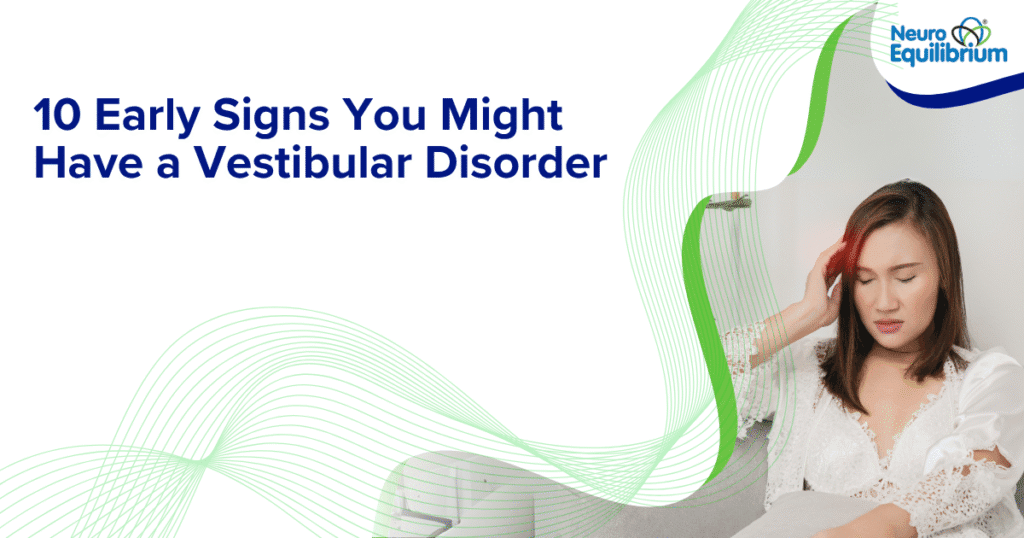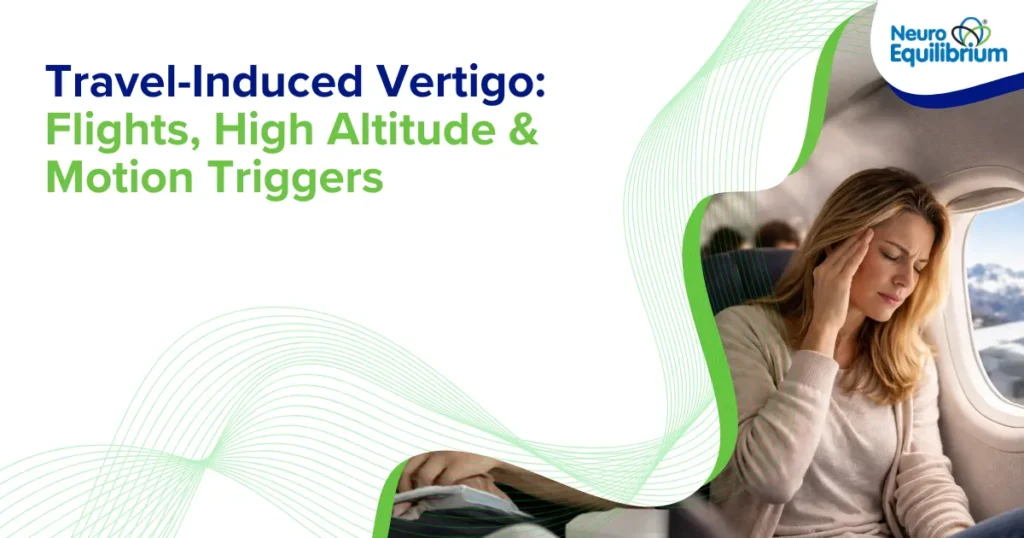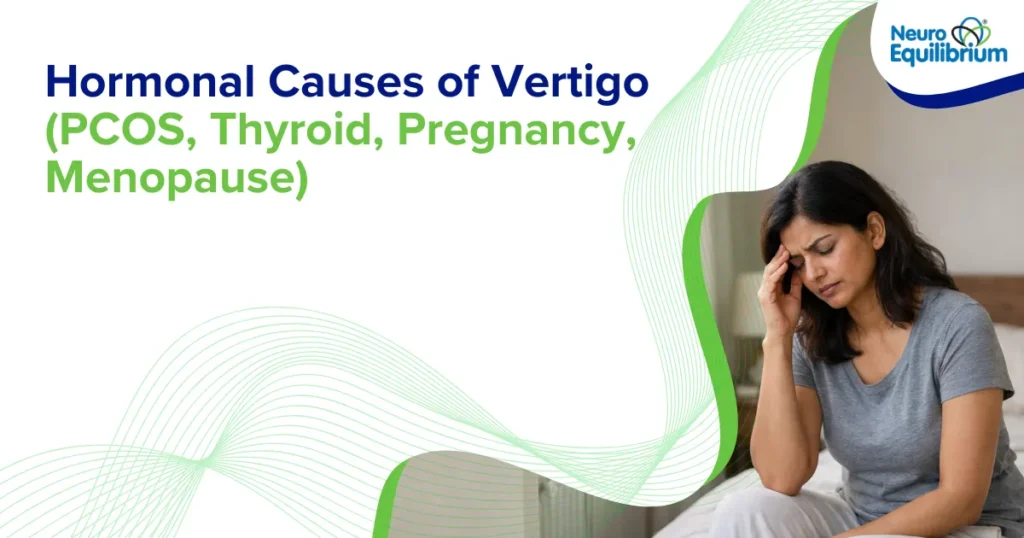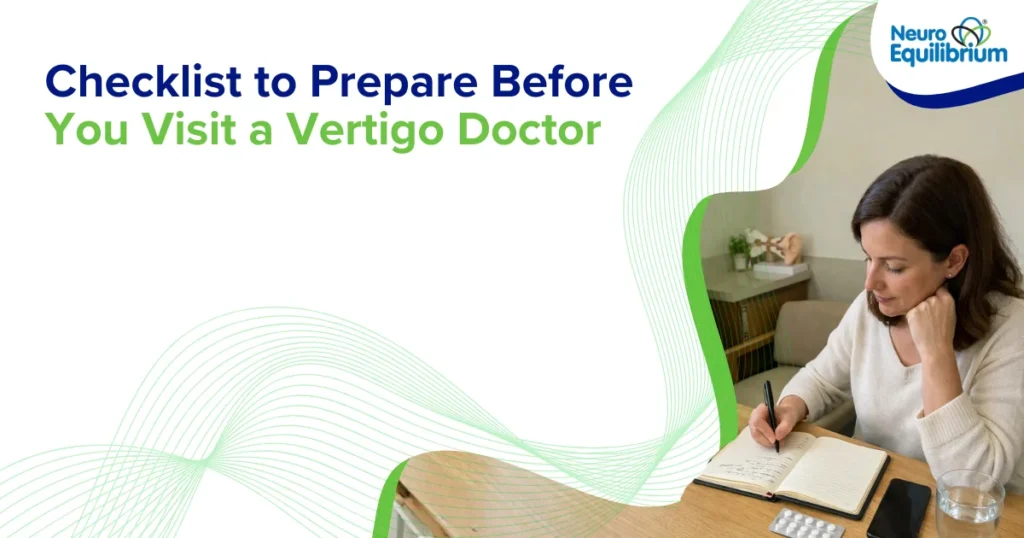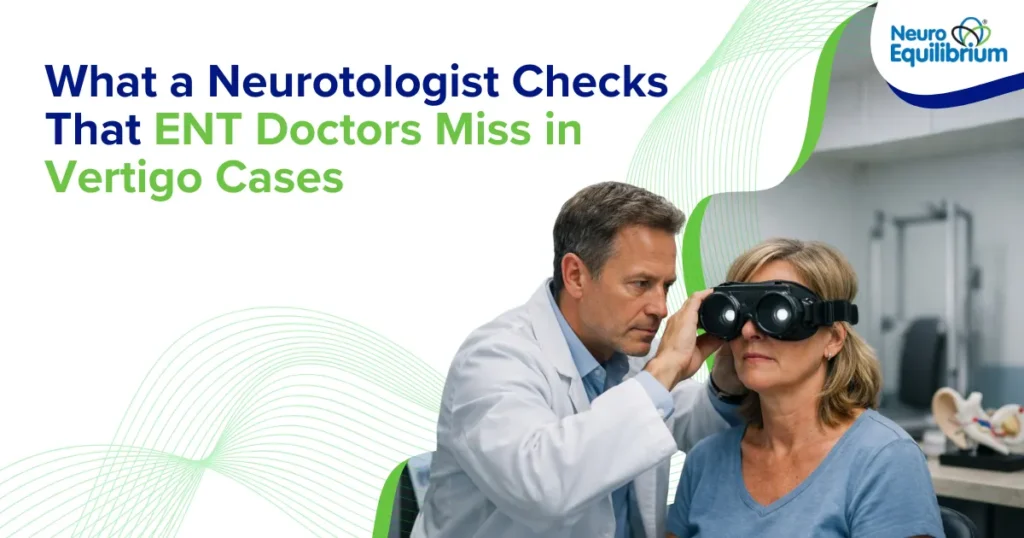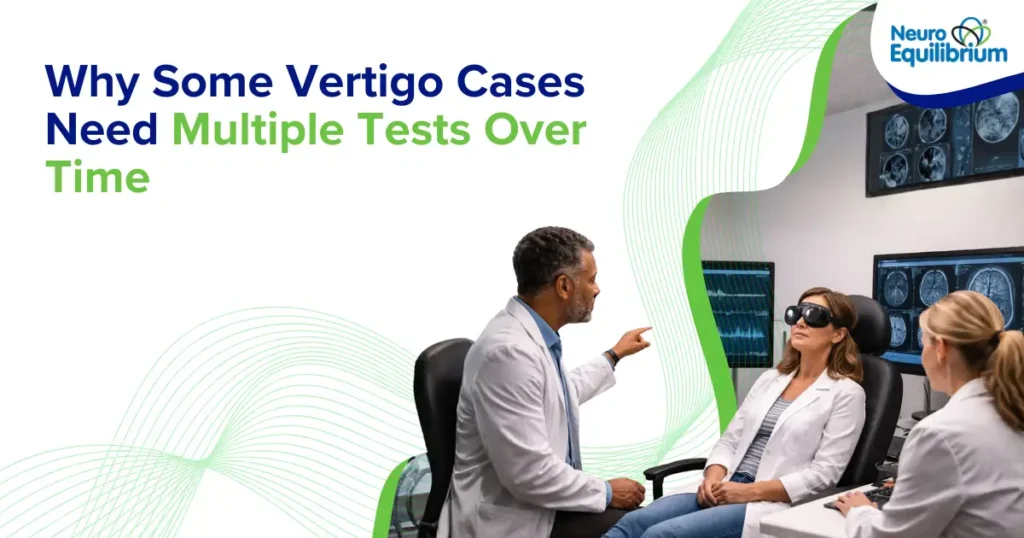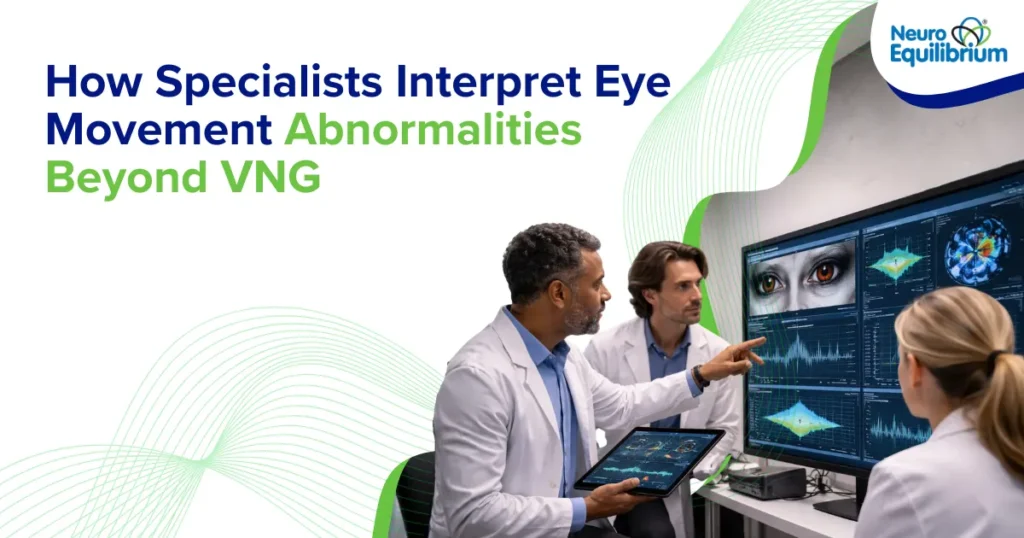Have you ever had that strange dizzy feeling where you feel unbalanced on your feet, like the world is spinning around you? These experiences are not always simple nuisances that you may shrug off. They may even be precursors of a vestibular disorder. These disorders include issues with your inner ear and brain which are imperative to the way you feel a sense of balance, how you know where you are in your space, and how you coordinate your movements.
Although the problems are rather common, they are frequently not diagnosed properly. It implies that a great number of individuals are forced to live with enigmatic symptoms and not being aware of what is happening. Being aware of these early indicators may be a start towards proper diagnosis and the appropriate treatment. Here are 10 of the most important symptoms that could indicate a vestibular disorder.
Know More About
- How Vertigo Exercises Help Cure Vestibular Disorders?
- Why Your Vestibular Health is Key to Overall Well-being
- How Vestibular Testing Can Help When MRI and CT Scans Don’t
1. Frequent Dizziness or Lightheadedness
A lot of people interchange the terms dizziness and vertigo, yet there is a rather significant distinction. Dizziness can be experienced as being lightheaded, faint, or otherwise unsteady. It is that sense of being slightly wobbly without actually spinning. When you start to feel these sensations regularly without any apparent cause, such as being dehydrated or hungry, it might be an indication that something is wrong with your vestibular system. This is the system that makes your brain know how your body is situated in space and keeps you oriented. Constant dizziness may disrupt your daily life and general well-being. This may be severe spinning or slight imbalance or even the feeling of tilting or swaying when your body is at rest. Others also report it as an inability to concentrate the eyes.
2. Feeling Off-Balance or Unsteady While Walking
Are you frequently stumbling or leaning to one side, or like you are about to fall even when you are walking on a flat surface? This sense of being off balance or even what is sometimes called chakkar or a general imbalance is a classic and very common manifestation of a vestibular problem. It can often be a lot more apparent when you are in trickier circumstances, such as walking on an uneven surface, or trying to get around in the dark, or trying to go through crowded places where your brain has to process a lot of different sensory information simultaneously. You may also become less sure on your feet, or feel like you need to reach out to something more frequently.
3. Vertigo: The Sensation of Spinning
Vertigo, as opposed to a general feeling of dizziness, is that peculiar and usually violent feeling that you or things around you are spinning or tilting or moving when they are not. This sensation may be a minor wobble, or an extremely violent, nauseating spinning that can be quite incapacitating. It is usually initiated by certain movements of the head, or sudden positions, as when the person rolls over in bed, rises in the morning, looks up at the sky, or even bends down. The attacks are usually abrupt and in diseases such as Benign Paroxysmal Positional Vertigo (BPPV), may diminish in less than a minute and in some cases even in less than 30 seconds.
4. Motion Sickness or Discomfort During Travel
If you naturally tend to get car sickness or sea sickness, that’s just how your body reacts, and it’s perfectly normal. However, if you suddenly notice a significant increase in motion sickness or feel extremely uncomfortable during travel even on short trips where you used to feel fine it could be an early sign of a vestibular condition. The vestibular system is crucially important to you in terms of motion and acceleration interpretation. In case of a problem with it, your brain may interpret the signals that it is getting incorrectly, becoming hypersensitive to movement and causing even a short car ride to seem miserable. Busy or moving visual fields can also make you feel less steady when walking across the road, ascending an escalator, or even having a look at moving objects.
5. Nausea and Vomiting That’s Not Related to Food or Infection
Nausea is usually related to stomach problems, stomach bugs, or other diseases. But when you experience nausea and vomiting, which is not food or infection related, especially when it is regularly accompanied by a sense of dizziness, confusion, or vertigo, then it might well be your vestibular system giving you an early warning. This uncomfortable symptom can be activated by the sensory conflict going on in your brain when your vision, inner ear, and body senses are not in agreement, and you feel generally unwell even though your stomach is fine. This can be observed in some conditions, such as Vestibular Migraine or Meniere’s disease.
6. Blurred Vision or Trouble Focusing (Visual Disturbances)
Are you aware of a feeling that you are seeing in a jerky fashion as you are walking, or do you have difficulty in keeping a fixed gaze on an object in motion? This may be associated with a vestibular-ocular reflex (VOR) problem that is a reflex that is used to steady your vision and keep images clear as you move your head. Poor ability to follow moving objects with smooth eye movements or constantly blurred vision that cannot be corrected with glasses are common and very significant early symptoms of a vestibular disorder. This visual instability may result in difficult tasks such as reading when walking or watching a moving car.
7. Sensitivity to Loud Sounds or Enclosed Spaces
Strange and painful proclivity to loud sounds (occasionally referred to as hyperacusis) or being overwhelmed and anxious in the presence of a lot of people and noise may in some cases be related to vestibular issues. This may happen due to the fact that on the one hand, a dysfunctional vestibular system is finding it more difficult to filter out auditory distractions, whilst on the other hand, your brain is really working hard to keep you on your feet. The feeling of being dizzy or disoriented can then be aggravated by the noise overload, so you will be eager to stay away. As an example, patients with vestibular migraine can be intolerant of loud noise or light because their sensory system is over-sensitive.
8. Persistent Ear Fullness, Ringing, or Hearing Changes
Different ear problems may have numerous possible causes, but persistent a sense of fullness or pressure in the ear, particularly when combined with ringing in the ears (tinnitus), may be a red flag of some vestibular disorders, including Ménière’s disease. In Ménière’s, these symptoms tend to vary and are also accompanied by loss of hearing in most cases on one ear. Almost complete loss of hearing in one ear; with extreme spinning, may be caused by such other conditions as Labyrinthitis. In rare conditions it is also possible that acoustic neuromas may cause gradually progressing hearing loss and loss of balance.
9. Fatigue and Brain Fog After Simple Tasks
Maintaining balance and processing all the sensory information we receive takes a lot of mental energy. When the vestibular system isn’t working properly, your brain has to work extra hard to interpret the inaccurate signals, which can lead to feelings of exhaustion and mental fog. Tasks that once felt easy and automatic might now tire you out mentally because your brain is busy trying to make sense of all the confusing information coming through your senses, even as it helps you stay upright. This extra effort can also make it more challenging to switch between tasks smoothly.
10. Increased Risk of Fallsm
This is a very serious symptom, especially in older adults, but can occur in any person. A frequent greater risk of falls , particularly when attempting to do several things simultaneously (e.g. talking and walking), when walking in dim light conditions or on irregular surfaces, is a good sign that there is a problem with your balance. Do not simply dismiss such accidents as clumsiness, they can produce serious consequences and require a complete check-up. This issue may also cause limited daily activity and loss of mobility as you attempt to prevent any scenario in which you may fall.
Psychological and Behavioral Impacts of Vestibular Disorders
Having a long-term vestibular disorder does not only interfere with your physical stability but it can actually take a toll on your psychological health as well.
- Loss of Confidence: The frequent spells of dizziness and loss of balance can make a big dent in your confidence. Even the most basic tasks, which you never even thought twice about, such as walking through a busy market or simply leaving your home, can become intimidating.
- Fear of Falls: This is a normal and agreeable fear, particularly among the older adults. This fear may result in you limiting your daily activities and becoming less mobile, resulting in a cycle of deconditioning and more unsteadiness.
- Anxiety and Depression: It is highly possible that individuals with vestibular conditions develop anxiety or depression. This is partly due to the fact that the condition impacts on your capacity to perform daily tasks, and multi-tasking which may result in limiting activities or becoming a recluse. Symptoms can also be unpredictable, which can lead to worry on a regular basis.
- Hypervigilance: You may also get overly conscious of the sensations in your body and possible causes of dizziness when you have been experiencing them over a period of time. In such a hypervigilance, you may even get an ironical perception of dizziness as your brain is more alert to any minor balance.
Signs in Specific Populations
Vestibular disorders don’t just affect adults in the same way. How they present can differ across age groups.
In Older Adults (over 60 years):
Dizziness and vertigo become a significant health threat in individuals aged above 60 since they significantly contribute to the likelihood of falling and fall-related injuries. In fact, falls are the main cause of injury deaths in elderly people. People who already walk with difficulty, have balance problems, memory loss, depression, or hearing loss are even more likely to fall because they are aging. Unsteadiness or temporary blackouts can also be caused by conditions such as postural hypotension (where blood pressure suddenly drops when a person stands up) and increases the risk of falls.
In Children (3-17 years):
Approximately 6 percent of children have vertigo and balance issues. It is common to find that children who lose hearing have related vestibular issues. Vertigo may also be misdiagnosed in children since they may not explain their problem well, or parents may think it is an avoidance behavior or rather an excuse not to go to school. The symptoms to be aware of in children are frequent falling, inability to concentrate, or vomiting of unknown causes. Vertigo may manifest itself through a child avoiding some activities he or she enjoyed or does not feel like playing. These episodes can make younger children very scared and clingy which may even result in phobias.
Signs of Potentially More Serious Issues
Although vertigo is mostly caused by issues of the inner ear, it is worth noting that it may also be an indication of issues concerning the brain or other body systems. In less common cases, vertigo may be an indication of a more severe disease such as stroke, multiple sclerosis or a brain tumor.
It is quite essential to inform your physician about all your symptoms. When you have any of the following symptoms during a vertigo attack, get medical attention as soon as possible because it may be a sign of a severe underlying condition such as a stroke:
- Severe headache
- Blurring of vision
- Slurred speech
- Double vision
- Weakness in any part of the body
If you are experiencing any of these signs, it is strongly recommended to get evaluated by a doctor, ideally an expert in treating vertigo and dizziness. They can provide a thorough assessment and an accurate diagnosis.
When Should You See a Specialist?
It is highly advisable to see a doctor when you experience two or more of these symptoms of the vestibular disorders and they are occurring quite frequently or interfering with your life. It is of critical importance that you are diagnosed early and it can significantly improve your recovery. Left unaddressed, these symptoms can lead to the worsening of balance and an increased risk of falls as well as the severe degradation of your life quality. It is not a good thing to wait until the symptoms become serious.
How Vestibular Rehabilitation Can Help
After a vestibular disorder has been diagnosed, a very effective treatment route is usually available: vestibular rehabilitation. It is a special, customized exercise-based therapy which is developed to recondition your brain to overcome any of the deficiencies of your inner ear. By means of specific vestibular rehabilitation exercises, including gaze stabilization exercises (to make your eyes stay still), balance training (to regain your own stability), and habituation exercises (to avoid feelings of dizziness when performing certain movements), therapists will assist your brain in adapting to new strategies to restore your balance and limit your symptoms. It is a discipline that can help you to take control of your body movements and responses.
NeuroEquilibrium offers advanced diagnostic testing and personalized vestibular rehab programs across India. Our team of experts can help identify the precise root cause of your symptoms and then create a tailored treatment plan to get you back on your feet, moving with confidence.
Take the first step toward restoring your balance: Book an Assessment with NeuroEquilibrium.
Conclusion
Having a vestibular disorder can definitely be difficult, and it can have numerous implications on your everyday life. Yet, one should keep in mind that most of these conditions can be treated with proper care and support. Learn not to dismiss the initial signs that your body may be giving you. By taking action earlier, you can make a significant impact on the process of your recovery and recuperate your independence and live a better life.
Sources
- Vestibular Disorders Association (VeDA). “Vestibular Disorders – What Is Vestibular, Symptoms & Balance.” https://vestibular.org/article/what-is-vestibular/vestibular-symptoms/ (Vestibular Disorders Association)
- “Vestibular Balance Disorder.” Johns Hopkins Medicine. https://www.hopkinsmedicine.org/health/conditions-and-diseases/vestibular-balance-disorder (Hopkins Medicine)
- “Vestibular Disorders — Symptoms, Causes and Treatment.” Apollo Hospitals. https://www.apollohospitals.com/diseases-and-conditions/vestibular-disorders-symptoms-causes-and-treatment (Apollo Hospitals)
- Dougherty JM. (2023). “Vestibular Dysfunction.” StatPearls. — Symptoms such as vertigo, nausea, imbalance, intolerance to motion, spontaneous nystagmus. (ncbi.nlm.nih.gov)
What exactly is a vestibular disorder?
A vestibular disorder is an ailment, which can affect your inner ear equilibrium system or the areas of your brain that translate equilibrium and spatial data. This may cause symptoms such as dizziness, vertigo, and unsteadiness.
Are vestibular disorders common?
Yes, they are more prevalent than most people can even imagine them to be, and they are usually misdiagnosed or diagnosed any less hastily than it is necessary.
Can these symptoms be caused by other things?
Absolutely. Most of the listed symptoms, such as dizziness or fatigue, might be induced by other health disorders. This is why it is so essential to visit a specialist to get a correct diagnosis in case you have some long-term issues.
How long does vestibular rehabilitation take?
Vestibular rehabilitation takes different periods per individual depending on the type of disorder, its level of severity and your response to the therapeutic process. Your therapist will develop an individual plan and will talk to you about the estimated timeframe.
Is vestibular rehabilitation painful?
The exercises included in vestibular rehabilitation may cause a little bit of dizziness or imbalance at first as your brain gets used to the changes. These sensations, however, tend to be short term and can be controlled by your therapist to make sure that you feel comfortable and safe during the sessions.






